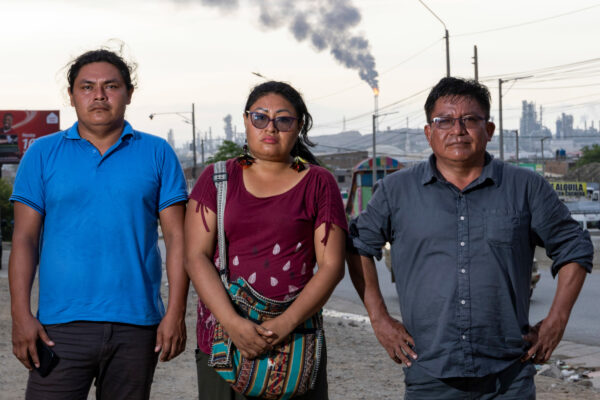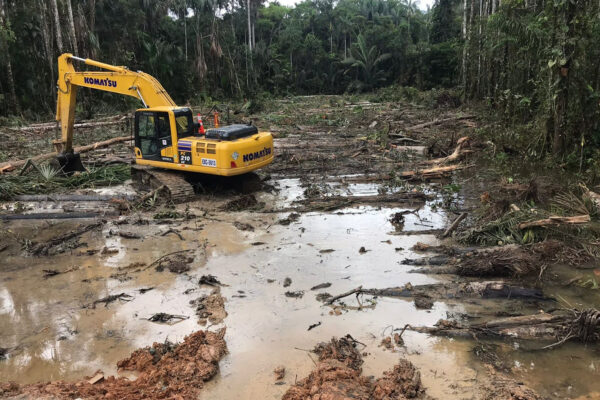All photos by Telmo Ibarburu
As COVID-19 wreaks havoc on lives, health care systems, and economies around the globe, perhaps nowhere has been hit harder than Ecuador. In a country where political, social, and economic upheaval are routine, Ecuador is grappling with a trifecta of tragedy never before seen despite its tumultuous history.
The country not only has one of the highest numbers of COVID-19 cases in the world, but it is also facing a pipeline rupture that has contaminated Amazon rivers and shut in production of crude – Ecuador’s top export – amid oil’s unprecedented price plummet. Ecuadorians are also recovering from historic flooding in the Amazon that has devastated local communities and left hundreds of families without homes or crops.
Ecuador’s COVID-19 cases have ballooned to more than 24,900 – an astonishing number for one of South America’s smallest countries. The epicenter of the outbreak is the port city of Guayaquil, formerly a bustling hub of economic export activity. Now the population is in the throes of a dire health emergency that has overwhelmed the state health care system, resulting in bodies piled on the streets and coffins in short supply.
Along with COVID-19, another humanitarian crisis is unfolding in the Amazon. On April 8th, both of the country’s transnational oil pipelines ruptured, dumping thousands of barrels of oil into the Coca River and its tributaries. The pipelines bring crude from the Amazon across the Andes to refineries on the Pacific coast, most of which is destined for California. It is the largest spill in a decade and a direct result of government negligence after it ignored reports of severe erosion underneath the pipelines. Indigenous organizations filed suit this week, with support from national and international organizations, including Amazon Watch, over the government’s violation of their rights to health, territory, food and water sovereignty, and the rights of nature. Crude has been washing up as far away as Peru, compounding the already vulnerable situation of Indigenous peoples as they work to prevent the impact of COVID-19 in their territories, while struggling with food security, access to potable water and sanitation supplies.
With traditions and practices that are inherently communal, immune systems vulnerable to outside illness, and a complete lack of government support, Indigenous peoples are uniquely at risk to the COVID-19 pandemic. The historic memory of disease and decimation brought by intruders on their lands like rubber tappers, loggers, missionaries, agribusiness, and the extractive industries is still present. To prevent further exposure to the COVID virus, Indigenous peoples are proactively blocking roads, bridges, river, and plane access to their territories to keep people out, and are calling for a moratorium on extractive industries and industrial agriculture in their territories.
“We are the ones who are protecting standing tropical forests, precisely what’s necessary to prevent further pandemics as well as climate change,” said Gregorio Diaz Mirabel, President of the Coordinating Body of Indigenous Organizations of the Amazon (COICA). Indeed, recent research shows that deforestation and development in frontier ecosystems leads to greater contact and potential disease exposure between humans and animals and increases risk of more pandemics.
On the Brink of Economic Collapse
Meanwhile, Ecuador is facing economic ruin. COVID-19 has quashed global oil demand, which, combined with an existing supply glut, has led to the collapse in the price of crude, the country’s biggest export. Ecuador is a former member of OPEC – a low-income producer heavily dependent on petroleum, with big plans to expand production. The country now estimates a 40% reduction in government revenue from the crude price collapse, and it’s still weeks away from repairing the pipelines and being able to transport its crude. But the production cost per barrel in the Ecuadorian Amazon averages roughly $39 – an economic catastrophe given oil was in negative territory last week. The country is slated to be producing oil at a loss for the foreseeable future.
Ecuador is saddled with $65 billion in public debt, much of which is in oil-backed loans from China. The country is facing default on an estimated $17 billion in bonds, while the tourism industry–a major source of non-commodity revenue–has dried up. Because the country operates on the U.S. dollar, its economic flexibility is further constrained, leaving it few options to provide public health and economic resources to Ecuadorians during the COVID-19 crisis.
Amazonian Communities Underwater
As Indigenous peoples scrambled to prepare to confront COVID-19, torrential rains over the month of April led to historic flooding of the Bobonaza River in Ecuador’s central Amazon, washing away the homes and crops of hundreds of families, along with community bridges. Among the hardest hit are the Kichwa of Sarayaku, where waters reached unprecedented levels. The river crest reached the roofs of traditional communal houses, taking everything in its path – pots, pans, machetes, solar panels, food, and more. A second round of flooding came days later, undoing much of the rebuilding that was underway.
“We have never witnessed anything like this,” said Patricia Gualinga, a longtime Sarayaku leader who helped organize rescue and relief efforts. “Not even our elders have stories of floods of this magnitude. Our families were lucky to escape with our lives. It is unimaginable, but yet another sign of how climate change is disrupting the ecological cycles of the Amazon. We are fighting on the front lines to protect our forests for our survival and that of the planet, but we are already bearing the brunt of climate chaos.”
Amazon Watch and Rainforest Action Network responded to our partner’s call for support and contributed $10,000 in matching funds to support the emergency response fund. Together we mobilized to raise close to $60,000 to rebuild their community as well as support other affected Indigenous communities in the area.
Criminalization Continues
The Ecuadorian government has failed to respond to COVID-19, the floods, and the spill in the Amazon. Yet, the Ministry of Justice still had the capacity – even while constitutional provisions are suspended and shelter in place orders are in effect around the country – to summon the president of Ecuador’s national Indigenous organization, Jaime Vargas, to appear and respond to trumped-up charges of terrorism over last October’s Indigenous uprising.
“How is it that during a pandemic that is decimating the country, the government has the time to persecute Indigenous leaders? It just shows how backwards the priorities are of the Lenin Moreno administration,” said Vargas. Vargas took a stand, and chose to ignore the summons.
Towards a Just Transition
If there were ever a time for a just transition off of fossil fuels in Ecuador, it’s now. The current scenario is the polar opposite of a just transition and managed decline of fossil fuel extraction which Indigenous peoples and ally organizations have been advocating.
Many of the loans that have trapped Ecuador into a downward spiral of debt and dependency for decades – and locked the country into export-driven commodity extraction – came via structural adjustment packages, pro-industry regulatory capture, and bailouts from the country’s previous economic and political turmoil. As new emergency loan offers from International Financial Institutions and China come in, and debt payments are restructured and rescheduled, it is essential to make sure new agreements don’t lock Ecuador into expanding extraction in the decades to come.
Economic support for Ecuador to weather this crisis must include debt relief and forgiveness, not just new loans. Traditionally Ecuador hasn’t qualified for these types of packages because international funders deemed the country too rich in mineral wealth. For a place that holds some of the most biodiverse tropical rainforest on the planet, essential for climate change mitigation and home to peoples living in voluntary isolation, cancelation of debt or a debt swap with its largest creditors, like China, is essential. Given the climate crisis and need for rapid phase-out of fossil fuels, Ecuador needs global support to keep its billions of barrels of oil in the ground and shift to a post-petroleum economy.
The current crisis illustrates the vulnerability of the country’s resource-dependent economy, the need to heed lessons from the past to prevent new mistakes. Oil has failed to be the economic panacea for the country’s economy that the government, companies, and financiers claim. Ecuador has not been able to drill its way to prosperity since oil was first discovered there in the 1960s, nor when oil was selling for $120 a barrel.
“In this time of multiple crises, we are invisible, yet again. But they’re planning to open up our territories the second this is over. And we won’t let that happen,” said Marlon Vargas, President of CONFENIAE, Ecuador’s regional Indigenous confederation. “There is no return to business as usual. We need a different model – one that respects rights, our forests, our climate, and an economy that is sustainable and not based on the boom and bust cycles of fossil fuels.”
This is a critical moment to advocate among government decision-makers, the public, and lenders that this is the time to reorient Ecuador’s economy away from the devastating dependence on extractives and towards sustainable economic alternatives that protect the well-being of its citizens, rights of Indigenous peoples, biodiversity, and the climate.




















